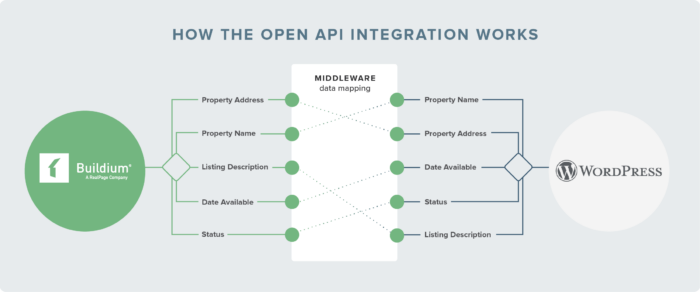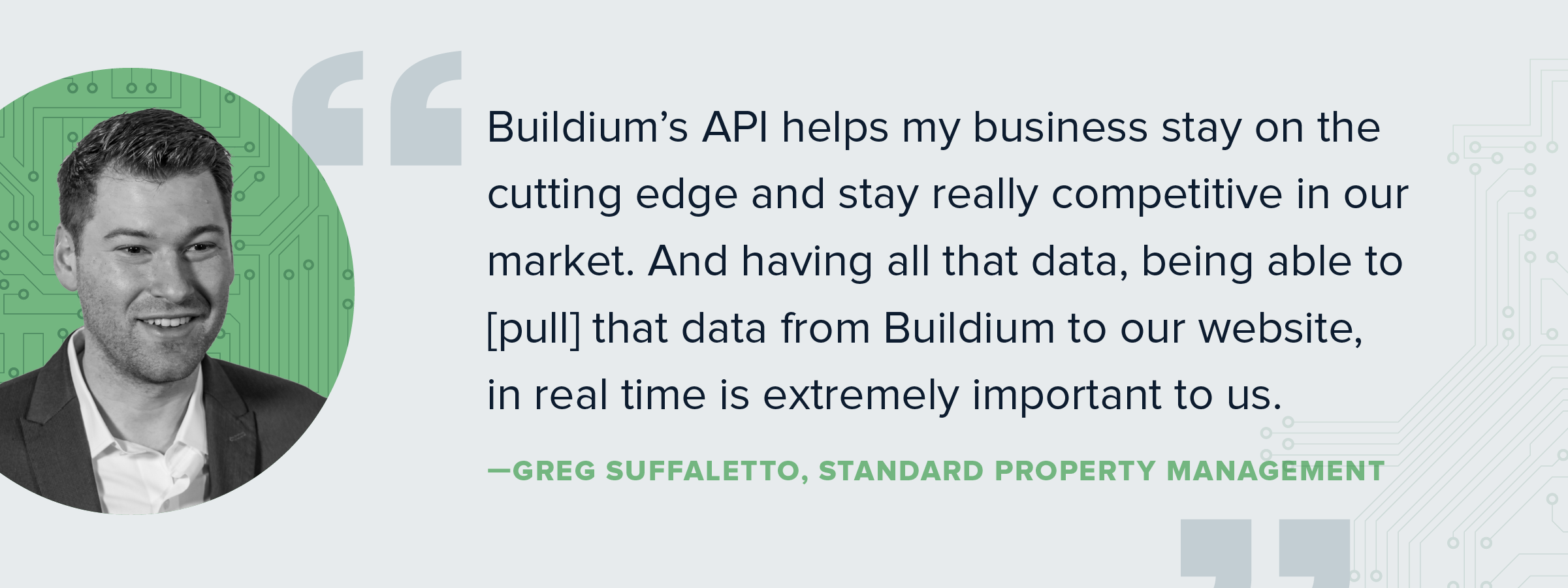Company Name
Standard Property Management
Door Count
2,400
Portfolio Type
Multifamily
Buildium Customer Since
2015
Company Name
Standard Property Management
Door Count
2,400
Portfolio Type
Multifamily
Buildium Customer Since
2015
A website used to be a simple page to advertise your business and maybe give prospects a way to reach you.
Now, you know it’s so much more than that. It’s a portal through which owners and prospects can interact with you on many levels. At the leasing level, it’s a means through which you can list your properties and get interested tenants to apply on the spot.
But having out-of-date listings creates a bad user experience. At best, prospects will think you just don’t update your site all that often. At worst, they’ll think you’re pulling the old bait-and-switch on them.
Greg Suffoletto, owner of Standard Property Management in Buffalo, NY, wanted to build a website that was easy to navigate, one with listings for his multifamily properties updated in real time and data pulled into one dashboard to help his team stay nimble and efficient.
To do that, he turned to Buildium’s Open API.
In this case study, we’ll take a look at exactly what Sufalleto wanted to accomplish through the Open API and his business’s site, and what the final results were.
But before we do that, let’s review what an Open API is.
There was a time, not long ago, where software, including property management software, came with a core set of tools and services for which you paid a monthly or yearly fee. If you needed functionality outside of those core tools, you had to look to another app.
And because software companies wanted to keep control of their proprietary software (makes sense, right?), your property management software couldn’t “talk” to other apps.
More and more, however, software companies across industries are understanding the benefits of allowing users at least some access to their software’s coding in order to customize their workflows.
They do that through an Open API.
Think of an API like a courier that constantly goes back and forth between a warehouse for you—delivering and also carrying your parcels of data (learn more about how an Open API works).

It can allow you to connect data and workflows from different apps into one source of truth, as well as give your team one point of access for all of your digital tools. You can also get it to pull data from Buildium into other databases as well to execute custom tasks for your properties.
As one Buildium property manager told us, “When Buildium opened up its API, that created a world of possibilities for us in terms of how we could interact with Buildium.”
For example, one property management company’s goal is to become a 100 percent keyless and paperless company. They’re using Buildium’s Open API to achieve that.
Sufalleto has a strategic 5- and 10-year growth plan in mind for his company. Part of its execution included a renovation of the company website to provide a better user experience for prospective tenants and a more efficient way for his team to collect data and update information.
He’s doing all of that using Buildium’s Open API. Let’s take a look at these goals more closely.
Suffoletto says he’s taking a page from the hotel industry, updating his site so that it displays real-time listing information.
“When we have a unit come open, it’s going to automatically show up on our website. It [pulls] the data [from Buildium] every hour. So basically, whenever we make a change or make a unit come up in a building, it’ll show up at our website and all the pictures will be there.”
Sufolleto also wanted to see the data they had been collecting through their website flowing through Buildium.
“We like the philosophy of getting our data through Buildium’s Open API because we’ve spent years kind of cultivating this data. And we really haven’t put it to work yet.”
To get these goals accomplished, Suffoletto hired an outside consultant who specializes in Open API. Although he had never connected to Buildium’s before, he found it very easy to work with and figured out how to use it very quickly with its thorough resources for developers.
He built out Standard Property Management’s website using the Open API to share information between the site and Buildium itself.
Now, as units become available, Suffoletto’s team updates their status in Buildium. From there, each unit is pulled into the proper category on the site. Prospects can then search for properties according to their budget.
“We really wanted to take a lot of features from the larger companies, the larger hotel chains, to make it truly easy to find an apartment for our prospects and for our tenants. When you go to look for a hotel, it’s very simple. It’s very easy. And I felt like ours was okay. It could be much better. So we used Buildium’s open API.”
On the other side of the coin, leasing agents update Buildium when units are no longer available, and the listings are refreshed on the site automatically, eliminating that bad customer experience of finding the perfect apartment only to discover it’s already been rented.
“As soon as we move it off the market on our Buildium site, it’s off our website.”
And when an application has been accepted, units are switched to a pending status, so prospects know exactly what’s available and what isn’t.
Standard Property Management categorized their available units into three tiers: select, luxury, and premium, as well. Using those terms makes it easier for his leasing staff to place applicants in units without having to use terms such as low cost or cheaper.

Because Standard’s website is now directly tied to Buildium, data is flowing not only to the listings page, but to Buildium’s dashboard, as well, making it the single source of leasing truth for the company.
“Before Open API, there were duplicate efforts going on. Every time we made a change in Buildium, we would have to go in and physically make a change on the website. One for one, that doesn’t seem like a lot, but you do it that many times and it becomes awfully cumbersome.”
Leasing agents no longer have to enter new listings—or take listings off the market—in two different systems.
“You can almost cut our leasing process in half for our leasing coordinators and our leasing agents. Sometimes our leasing agents know from the website quicker than they know from coming in the office that something’s no longer available. So that’s speed that you just can’t rival.”
By automating listings, Sufalletto says his leasing team has saved countless hours. He has fewer staff focused on redundant tasks.
“They could focus on talking to prospects, answering their questions and really making the leasing experience as seamless as possible. We’re twice as efficient as we were before the open API.”
Real-time listings and data collection through Buildium helped Standard Property Management achieve two major goals Suffoletto: process efficiency and a better leasing experience for prospective tenants.
By connecting data to and from Buildium, Suffoletto decreased the time and labor it took to enter listings and pull data from two sources.
Up-to-date listings that agents only have to enter in a single location is saving the company valuable time and resources, as well. Leasing coordinators and agents can now focus more of their time on reducing vacancy time, and give more attention to tenants.
By creating a better leasing experience for prospective tenants, they can continue to build their reputation as a top-notch property management company both with tenants and owners.
“Buildium’s API helps my business stay on the cutting edge and stay really competitive in our market. And having all that data, being able to [pull] that data from Buildium to our website, in real time is extremely important to us.”
As Suffoletto executes his expansion plans, Buildium and the Open API will be a key partner throughout the journey.
“I think if you’re not using it, you will be very shortly, because there’s no way around it. It’s the future.”
Open API gives property and community managers even more control over their day-to-day operations and helps them build out processes that reduce time and resources—and increase revenue.
To learn more, check out Buildium’s Open APIor request a demo.